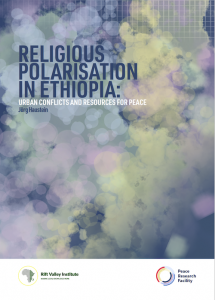SUMMARY
• This report studies the role of religion in recent inter-communal conflicts in Ethiopia outside of Addis Ababa. While not entirely neglecting disputes and perceptions in the capital, it seeks to paint a fuller and more versatile picture of religion and conflict in Ethiopia by drawing together insights from four Ethiopian regional cities: Dire Dawa, Gondar, Hawassa, and Jimma. This is based on original research in these cities, most of which has already been published in separate reports.
• Comparing these divergent field sites, the report studies how religion and ethnicity
interact in generating conflict, what role various socio-economic and political factors play, and to what extent inter-religious differences and intra-religious tensions amplify discord. In addition, the report offers a critical discussion of the contribution of religions in conflict resolution and prevention by considering the role of local interreligious councils, religious and political leadership, and inter-personal engagements and encounters.
• This report goes beyond seeking to establish basic facts and data about the studied conflicts. While these are important, in particular where official investigations are missing or perceived to be lacking credibility, this study recognises that people’s fears, hopes, and actions are determined by what they believe to be the case. This is why the main focus of the report lies in mapping out a variety of views and opinions across the different study sites in order to sketch out the (often competitive) diversity of contemporary perceptions of religion and conflict in Ethiopia.
• Consonant with insights from this research, the report conceptualises religion not as a separate social factor but as an embedded set of practices and beliefs that can never be fully disentangled from historical narratives, ethnic identities, settlement patterns, occupation and other social criteria. In all of the conflicts studied, religion thus acts in conjunction with other pressures on local communities and in many cases functions as a powerful conduit and catalyst in prompting conflict.
• This has important implications for governmental and non-governmental agencies seeking to engage religions in their peace-building work. Instead of furthering the simplistic juxtaposition of ‘extremist beliefs’ versus ‘peaceful religion’ more work must be done in enabling a contextualised, multi-factorial understanding in how religions operate in conflict or how they might offer an arena for peace. In particular, this means to invest in Ethiopian research capacity and to work in close proximity with local initiatives.
Find the Amharic version of this report here.
This report was written for the Ethiopia Peace Research Facility (PRF). The PRF is an independent facility combining timely analysis on peace and conflict from Ethiopian experts with support for conflict-sensitive programming in the country. It is managed by the Rift Valley Institute and funded by the UK government. This report is part of PRF’s Knowledge for Peace (K4P) series on religious polarisation in Ethiopia led by Dr Jörg Haustein.




